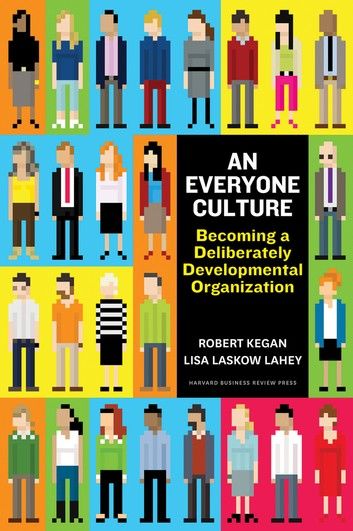| FindBook |
有 1 項符合
An Everyone Culture的圖書 |
 |
An Everyone Culture 作者:Robert Kegan,Lisa Laskow Lahey 出版社:Harvard Business Review Press 出版日期:2016-03-01 |
| 圖書館借閱 |
| 國家圖書館 | 全國圖書書目資訊網 | 國立公共資訊圖書館 | 電子書服務平台 | MetaCat 跨館整合查詢 |
| 臺北市立圖書館 | 新北市立圖書館 | 基隆市公共圖書館 | 桃園市立圖書館 | 新竹縣公共圖書館 |
| 苗栗縣立圖書館 | 臺中市立圖書館 | 彰化縣公共圖書館 | 南投縣文化局 | 雲林縣公共圖書館 |
| 嘉義縣圖書館 | 臺南市立圖書館 | 高雄市立圖書館 | 屏東縣公共圖書館 | 宜蘭縣公共圖書館 |
| 花蓮縣文化局 | 臺東縣文化處 |
|
|
A Radical New Model for Unleashing Your Company’s Potential
In most organizations nearly everyone is doing a second job no one is paying them for-namely, covering their weaknesses, trying to look their best, and managing other people’s impressions of them. There may be no greater waste of a company’s resources. The ultimate cost: neither the organization nor its people are able to realize their full potential.
What if a company did everything in its power to create a culture in which everyone-not just select high potentials”-could overcome their own internal barriers to change and use errors and vulnerabilities as prime opportunities for personal and company growth?
Robert Kegan and Lisa Lahey (and their collaborators) have found and studied such companies-Deliberately Developmental Organizations. A DDO is organized around the simple but radical conviction that organizations will best prosper when they are more deeply aligned with people’s strongest motive, which is to grow. This means going beyond consigning people development” to high-potential programs, executive coaching, or once-a-year off-sites. It means fashioning an organizational culture in which support of people’s development is woven into the daily fabric of working life and the company’s regular operations, daily routines, and conversations.
An Everyone Culture dives deep into the worlds of three leading companies that embody this breakthrough approach. It reveals the design principles, concrete practices, and underlying science at the heart of DDOs-from their disciplined approach to giving feedback, to how they use meetings, to the distinctive way that managers and leaders define their roles. The authors then show readers how to build this developmental culture in their own organizations.
This book demonstrates a whole new way of being at work. It suggests that the culture you create is your strategy-and that the key to success is developing everyone.
|




![塔木德:猶太人的致富聖經[修訂版]:1000多年來帶領猶太人快速累積財富的神祕經典 塔木德:猶太人的致富聖經[修訂版]:1000多年來帶領猶太人快速累積財富的神祕經典](https://media.taaze.tw/showLargeImage.html?sc=11100697818)






